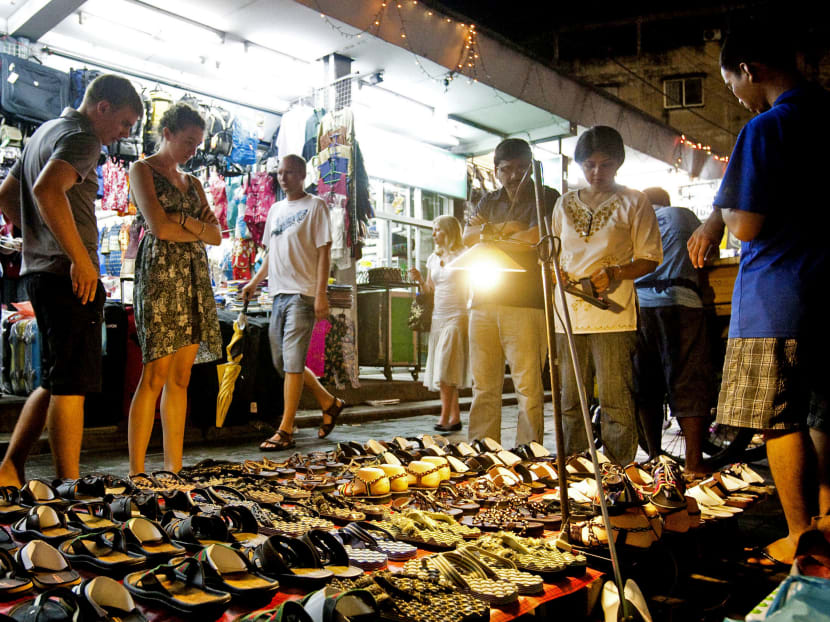Thailand’s shadow economy thriving despite graft crackdown
BANGKOK — Fern’s cocktail bar appears each night on a sidewalk between a group of scantily clad women from the next-door go-go club and a noodle stall near one of Bangkok’s infamous red-light districts. By morning, it vanishes.

A street market on Sukhumvit Road in Bangkok, where untaxed businesses from food stalls to jewellery vendors are everywhere. Photo: Bloomberg
BANGKOK — Fern’s cocktail bar appears each night on a sidewalk between a group of scantily clad women from the next-door go-go club and a noodle stall near one of Bangkok’s infamous red-light districts. By morning, it vanishes.
The bar, prostitution and even the food stall are illegal — part of a shadow economy that an economist has estimated to be worth more than two-fifths of Thailand’s gross domestic product.
The ruling military junta says it has cracked down on corruption, and that is the reason the country has experienced the slowest economic growth among developing nations in East Asia.
Yet, on the streets of Bangkok, there is little sign of any difference. Payments to bribe officials and mafia are higher now, so everyone is earning less, said Ms Fern, who uses an alias as the bar she has been running for almost five years is illegal. She said it has become more expensive since the army took over because the people she pays said they also have to pay more.
“Thailand’s shadow economy ranks among the highest globally,” said economist Friedrich Schneider, from Johannes Kepler University of Linz in Austria and the author of Hiding in the Shadows: The Growth of the Underground Economy. He estimated that Thailand’s shadow economy was 40.9 per cent of real GDP last year, including illegal sectors such as gambling, but largely excluding drugs.
On the streets of Bangkok, there are undocumented and untaxed businesses everywhere, from food stalls to pop-up bars like Fern’s. Inside the buildings and away from the capital are darker corners of the illicit market: Sex workers, gambling dens, drug smuggling and human trafficking.
Ms Fern said she makes three cash payments each night, one to a local official, the second to a fixer who oversees street stalls in the area, and the third and largest to someone who claims to represent the police. That last bribe has risen about 75 per cent since the junta crackdown began, she added.
The junta, which seized control of the country in a coup in May last year, has spoken frequently of the need for a corruption cleansing, not only among the nation’s politicians but society at large. While there have been a handful of high-profile arrests of those accused of corruption or human trafficking, the junta has largely focused on small-scale public-order issues such as banning sunbed rentals on public beaches or clearing vendors from some Bangkok sidewalks.
“Today, the economy is slowing down because previously, everybody had money to spend,” junta leader-turned-Prime Minister Prayuth Chan-Ocha said on June 5 in a nationally televised speech. “But now, we have a problem, which we all know. It’s because some people spend money from illegal businesses and money from fraud. Now the government has come to set things right, causing that money to disappear.”
The Thai economy grew 3 per cent in the first quarter as exports and prices declined. Last year, growth was the slowest in four years.
“There is little evidence on the policy front that the army government has made much progress in making state enterprises or the civil service more accountable to the public,” said Ms Ambika Ahuja, a London-based analyst at Eurasia Group, a political-risk adviser. “What the army has done, however, is ramp up on anti-corruption rhetoric, and part of that is to explain away why the economy has been performing below potential.”
The real problems facing the economy are demographics, labour costs, an over-reliance on raw-material exports and loss of competitiveness, added Ms Ambika. Thailand has been losing its export competitiveness in electronics in the past three years, while investment in research and development has lagged behind Singapore and Malaysia, the central bank has said.
Nearly a third of Thais will be above 60 years of age by 2020, compared with less than a sixth in the Philippines and a fifth in Malaysia, said the United Nations.
Government spokesman Sansern Kaewkamnerd said it is serious about tackling corruption. He pointed to a government committee against graft, chaired by Mr Prayuth, which oversees anti-corruption policy and the launch of a project against bid rigging.
He said several sub-committees had been formed, including one to cultivate good morals among children.
Mr Sansern said more than 300 government officials who are suspected of being involved in corruption cases had been transferred to inactive positions to ensure they would not influence the process of gathering evidence. “Tackling corruption in the public sector is the government’s top priority,” he said. “We can’t guarantee we will solve this problem 100 per cent, but we will do our best.”
Mr Chuwit Kamolvisit, a former massage-parlour owner who later became a politician and anti-graft crusader, said getting vendors off the streets is not going to remove corruption. “Corruption is a cancer. It is inside the body. Gen Prayuth can’t take care of the disease in one year as the problem is inside (the government).”
“It’s hard to crack down on corruption in Thailand. I don’t think we can handle it in our generation.” BLOOMBERG









